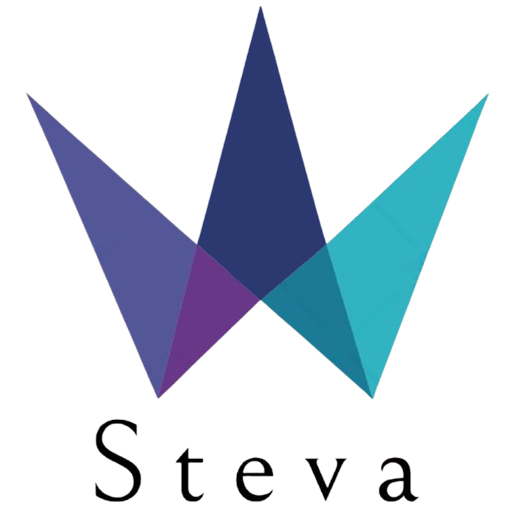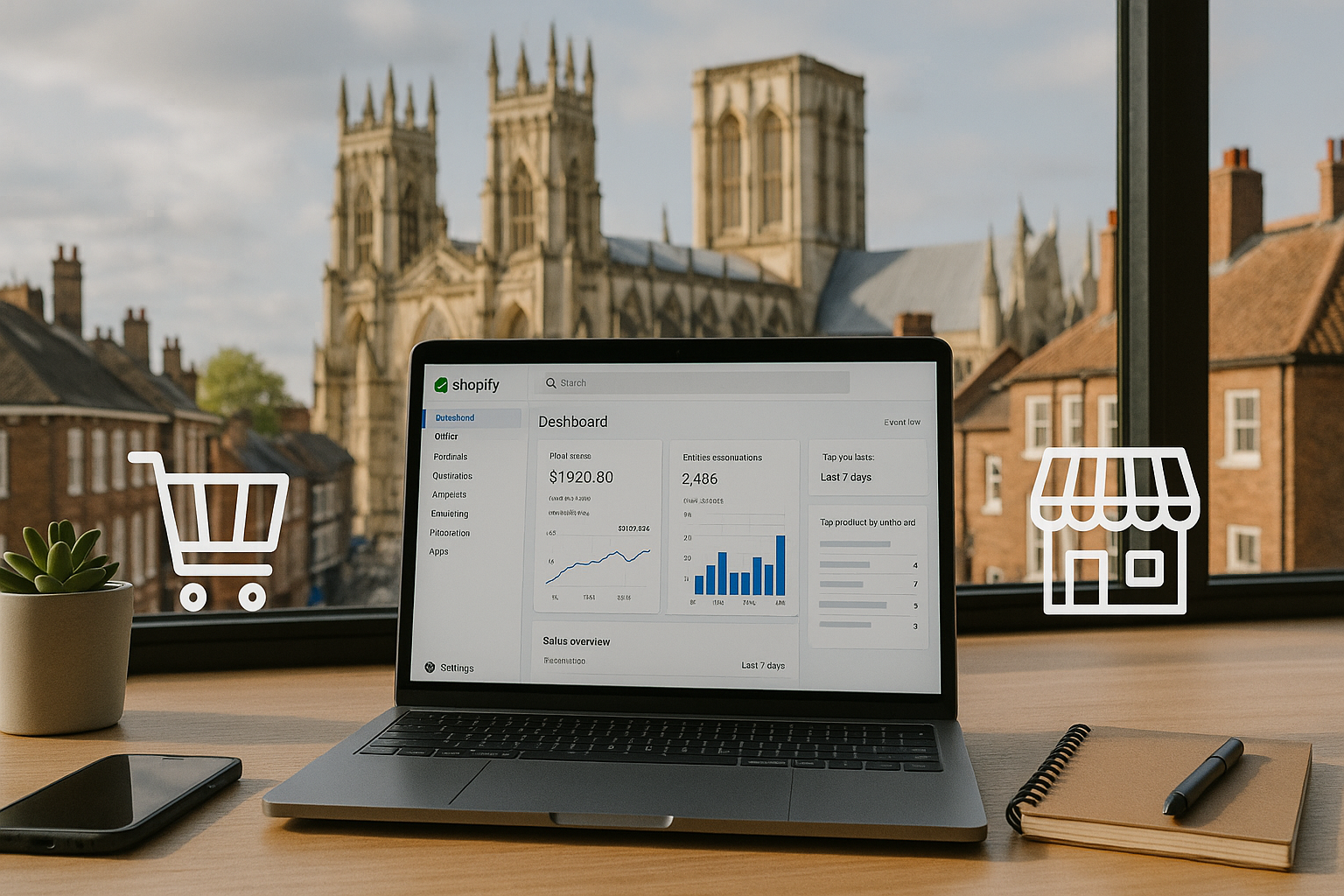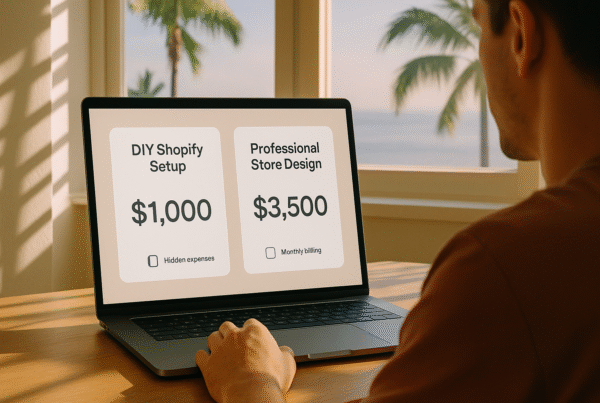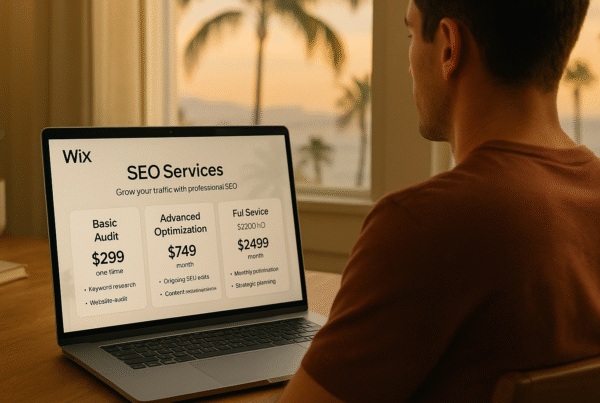Shopify development in York provides access to over 252 companies ready to bring your e-commerce vision to life. Whether you’re launching a new online store or upgrading an existing one, understanding the development landscape can save you time and money.
When exploring Shopify development in York e-commerce store development options, you’ll find professionals charging between $10,000 and $49,000 for the average project. However, some services start at $25,000 and can reach $50,000, depending on the complexity. Additionally, hourly rates for Shopify custom development in York typically range from $50 to $99 per hour. These investments often pay off, as evidenced by 100% of reviews highlighting the professionalism and ability of Shopify development service York providers to meet complex requirements efficiently.
This guide explains exactly what Shopify ecommerce store development in York involves for your business, from initial setup to customization. You’ll discover the typical processes, costs, and essential tips to help you make informed decisions without the technical jargon. Whether you’re a small local shop or an established brand, understanding these fundamentals is your first step toward e-commerce success.
Shopify Store Setup Process for York-Based Businesses
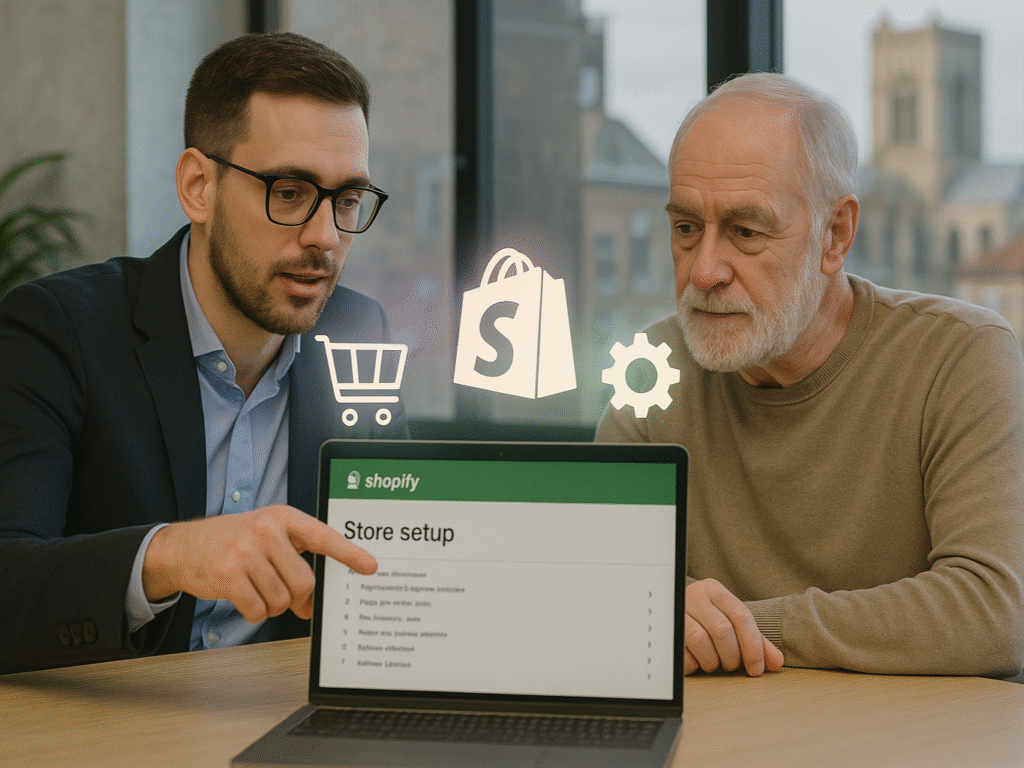
Setting up a Shopify store through professional Shopify development in York for your business involves several critical steps that impact your online success. The process requires careful planning, from selecting the right subscription plan to configuring tax settings specifically for New York State.
1. Choosing Shopify Plan: Basic vs Advanced
The foundation of your Shopify development in York begins with selecting the appropriate plan. Shopify offers multiple pricing tiers with significant differences in features and costs:
Basic Shopify costs $39 per month and serves as the entry-level option used by approximately 46.6% of merchants. This plan includes essential features like:
- Two staff accounts
- Unlimited products
- Abandoned cart recovery
- Discount codes and gift cards
In contrast, Advanced Shopify costs $399 per month and is used by approximately 7.6% of merchants. The higher price brings valuable additions:
- Lower credit card fees (2.4% + $0.30 compared to 2.9% + $0.30)
- Reduced third-party transaction fees (0.5% vs 2%)
- Fifteen staff accounts instead of just two
- Advanced report builder and automation tools
For York businesses expecting team growth or requiring detailed analytics, the Advanced plan typically becomes cost-effective once your transaction volume reaches a point where the saved fees offset the higher monthly cost.
2. Domain Setup and Store Configuration
After selecting your plan, configuring your domain establishes your brand identity. Initially, Shopify assigns a myshopify.com URL, but you have three options for establishing your professional web presence:
- Buy a domain through Shopify: This simplifies setup as Shopify automatically configures everything, including security certificates. Your domain settings are managed directly through your admin dashboard.
- Connect an existing domain: If you already own a domain from providers like Google Domains or GoDaddy, you can connect it by updating DNS records. This process typically takes two hours but may require up to two days to fully propagate.
- Transfer domain to Shopify: This option moves management entirely to Shopify, eliminating the need to maintain your third-party domain service.
Shopify automatically generates free TLS certificates for all domains, ensuring secure connections to your store. Furthermore, any additional domains automatically redirect to your primary domain, creating a seamless customer experience.
3. York-Specific Legal and Tax Settings
Setting up proper tax collection is particularly important for York-based businesses due to New York’s stringent enforcement of online sales tax laws.
New York requires out-of-state sellers to collect sales tax once they reach $500,000 in sales AND complete 100 transactions in the previous four sales tax quarters. Consequently, you must register for a New York Certificate of Authority before collecting any tax, as collecting without registration is illegal.
New York’s sales tax quarters follow a unique schedule:
- Q1: March 1 – May 31
- Q2: June 1 – August 31
- Q3: September 1 – November 30
- Q4: December 1 – February 28/29
Within Shopify, configure your tax settings by going to Settings > Taxes and duties, entering your tax number, and selecting the regions where you’ll collect tax. Shopify can automatically handle most common sales tax calculations, but you should regularly verify these rates with a tax professional.
Remember that certain products like groceries, dietary supplements, and clothing items under $110 are tax-exempt in New York, though you’ll still count these sales when determining your economic nexus thresholds.
Custom Shopify Development Services in York

Beyond basic setup, York-based businesses often require specialized Shopify development services to truly stand out in the competitive e-commerce landscape. Custom Shopify development solutions in York encompass a range of specialized services designed to create distinctive online stores that perform optimally.
1. Theme Customization for Local Brands
Professional Shopify ecommerce store development York experts excel at transforming standard themes into unique storefronts that reflect your brand identity. Rather than starting from scratch, many developers modify existing themes to align with your company’s visual identity while maintaining Shopify’s core functionality.
These customization services typically include:
- Custom layouts that highlight your unique selling propositions
- Brand-specific color schemes and typography implementation
- Navigation restructuring for improved user flow
- Product page redesign to showcase items effectively
Shopify custom development York experts create responsive designs that adjust seamlessly across devices while maintaining your brand’s aesthetic integrity. According to industry data, Shopify stores with customized themes tend to experience higher customer engagement, as users respond positively to cohesive branding elements.
2. Shopify App Integration for Inventory and ERP
One significant advantage of professional Shopify development solutions in York is seamless integration between your online store and backend business systems. ERP integration synchronizes data between Shopify and your enterprise resource planning system, ensuring real-time updates across inventory, orders, customer information, and financial records.
Effective ERP integration offers multiple benefits:
First, it enables real-time inventory management by maintaining accurate stock levels across all sales channels, minimizing overselling risks. Moreover, it automates order processing; when customers place orders, integrated systems automatically handle confirmation, invoicing, and the generation of shipping labels.
Shopify development solutions in York also implement specialized inventory solutions that connect your Shopify store with warehouse management systems. This integration becomes increasingly important as your business scales, providing end-to-end visibility into your entire supply chain. For businesses requiring advanced features and enterprise-level capabilities, exploring Shopify Plus development options in York offers enhanced scalability and customization possibilities.
Shopify Plus Development in York: A Practical Guide for Growing Businesses: Ready to scale beyond basic Shopify? Explore Shopify Plus development options in York, including advanced features, enterprise integrations, and scalability solutions that support rapid business growth and complex operations.
3. Mobile Optimization and UX Enhancements
With mobile commerce projected to generate $620.97 billion in sales by 2024, optimizing your Shopify store for mobile devices is no longer optional. Shopify ecommerce store development York specialists implement mobile-first design approaches, ensuring your store performs flawlessly across all devices.
Shopify development service York mobile optimization focuses on several critical areas:
Speed optimization ranks among the most crucial elements; research shows that even a half-second improvement in site speed can increase conversion rates. Professional developers compress images, implement lazy loading, and optimize code to ensure swift page loading times.
UX enhancement services go beyond visual design to create seamless shopping experiences. It includes optimizing navigation menus, improving search functionality, and streamlining the checkout process. Developers often use session replay tools to record visitor interactions, identifying and resolving issues with user experience.
Mobile payment integration represents another vital area for optimization. York developers implement accelerated checkout options, such as Shop Pay, Apple Pay, and Google Pay, to reduce abandoned carts. It is particularly important, as complicated mobile checkout processes frequently result in lost sales.
Through comprehensive mobile optimization, your Shopify store becomes accessible to the growing segment of customers who prefer shopping via smartphones and tablets, potentially boosting your conversion rates and sales volume.
Understanding Shopify Development Costs in York

Investing in Shopify development in York requires careful budgeting and understanding of cost structures. The price of bringing your York-based e-commerce vision to life varies significantly based on your specific requirements and business goals.
1. Typical Price Ranges: $1,000 to $50,000+
Shopify development investments follow a tiered pricing structure reflecting the complexity and scope of your project. For York businesses, these costs typically fall into three categories, and understanding the complete breakdown of Shopify website development costs in York helps you budget effectively:
Basic setup and customization typically range from $500 to $2,000. This entry-level investment covers theme selection, essential configuration, minor visual adjustments, and product uploads, providing a sufficient foundation for small businesses seeking a functional online presence without extensive customization.
Mid-level customization projects generally cost between $2,000 and $5,000. This range includes more advanced theme modifications, app integrations, improved navigation systems, and tailored user interfaces that better reflect your brand identity.
Full custom solutions for established brands range from $5,000 to $ 10,000 or more. These comprehensive Shopify development solutions York packages offer end-to-end customization, including bespoke design, custom app development, complex third-party integrations, and enhanced functionality built around specific business workflows.
For enterprise-level projects, costs can escalate significantly:
- Starter Shopify websites: $15,000–$20,000
- Custom Shopify websites: $30,000–$50,000+
- Enterprise Shopify websites: $60,000–$200,000+
2. Factors That Influence Cost: Scope, Features, Timeline
Several key elements determine where your project falls within these price ranges:
(i) Project Complexity
directly impacts development costs. Stores with advanced product catalogs, custom checkout processes, or unique user experiences command higher prices. Simple Shopify ecommerce store development York projects with fewer pages and basic functionality typically cost significantly less than sites that require complex functionality or custom applications.
(ii) Customization Level
affects pricing substantially. Using pre-built themes as templates with minor modifications is more affordable than creating completely custom designs. Full custom designs with unique aesthetic elements can increase costs by 200-300% compared to template-based approaches.
(iii) Developer Expertise
influences both quality and cost. York-based developers typically charge between $50 and $150 per hour, with rates varying based on experience:
- Entry-level developers: $15-$30 per hour
- Intermediate developers: $30-$75 per hour
- Expert developers: $75-$150+ per hour
(iv) The project timeline affects pricing.
Urgent projects often incur premium rates. Allowing 4-8 weeks for a custom store with moderate features versus 1-2 weeks for basic setup can result in significant cost differences.
(v) Integration Requirements
Systems like CRMs, ERP platforms, or marketing tools can increase costs based on complexity. Shopify custom development York integrations may add $1,000 to $5,000 or more to your project budget.
3. Fixed-Price vs Hourly Billing Models
When engaging Shopify developers in York, you’ll encounter two primary pricing structures, each offering distinct advantages:
Fixed-price contracts offer complete budget certainty, eliminating surprise invoices. This model works best for well-defined projects with stable requirements and clear deliverables. Payments typically follow a milestone schedule with funds released upon completion of specific objectives.
Conversely, hourly billing offers greater flexibility for evolving projects. Developers track time through work diaries or screenshots, billing only for logged hours. This approach enables you to add features or pivot direction without renegotiating the entire agreement, making it ideal for projects with uncertain requirements.
The pricing model shifts risk between parties; fixed-price contracts place the estimation risk on the developer, whereas hourly contracts transfer that risk to you, the client. For Shopify ecommerce store development, York businesses with clearly defined requirements typically provide better value and predictability through fixed-price agreements.
Shopify Development York Pricing: What Local Businesses Should Expect in 2025: Discover detailed pricing breakdowns, hidden costs, and budget planning strategies specifically tailored for York businesses. Get insider tips on negotiating with developers and maximizing your development investment for long-term success.
How to Choose a Shopify Development Partner in York

Selecting the right partner for your Shopify development in York project demands thorough research and careful evaluation of available Shopify development in York solutions. The developer you choose directly impacts your store’s performance, user experience, and ultimately, your business success.
1. Evaluating Portfolios and Case Studies
First and foremost, review live stores in a developer’s portfolio, not just screenshots. According to industry data, approximately 90% of clients praise creative developers for their responsive project management and timely delivery. Visit their previous projects and test functionality, loading speed, and mobile responsiveness. Look for projects similar to your requirements; a developer with experience in your industry understands the specific needs of your market. As noted by experts, 67% of clients prefer working with individuals who demonstrate experience across multiple sectors.
Check for case studies that explain challenges faced and solutions implemented. Professional developers showcase their problem-solving abilities through detailed case studies rather than simply displaying finished products.
2. Questions to Ask Before Hiring
Prepare specific questions to assess potential partners for your Shopify custom development project in York:
- Experience: “How many Shopify projects have you completed in the last 12 months?” Ideal candidates should have handled at least 3-5 recent launches.
- Technical expertise: “How do you optimize Core Web Vitals and page speed?” Look for specific answers about image compression, code minification, and efficient app usage.
- Support: “What post-launch support do you provide?” Clarify terms, 30 days of free support or hourly rates after completion.
- Process: “What’s your typical project timeline from kickoff to launch?” Standard Shopify custom development York timelines range from 4 to 8 weeks for theme customization and 8 to 16 weeks for custom builds.
3. Red Flags to Watch Out For
Remain vigilant for warning signs that might indicate problematic Shopify development service York providers. Beware of developers who avoid answering store-specific questions about your requirements. Similarly, those who make unrealistic promises without providing specifics often fail to deliver.
Poor communication during initial interactions forecasts future problems. Approximately 60% of clients highlight exceptional project management and responsiveness as key factors in successful Shopify development service York partnerships. Be cautious of developers whose portfolios consist mainly of slightly modified templates with minimal customization.
Lastly, never proceed without a detailed written contract that outlines the project scope, deliverables, timeline, payment schedule, and ownership of the final code.
Tips to Maximize ROI from Your Shopify Store
After launching your online store through Shopify development in York, the focus shifts to maximizing returns on your Shopify investment. Implementing proven optimization strategies helps York-based businesses transform visitors into customers while increasing average order values.
1. Focus on Conversion Rate Optimization (CRO)
CRO transforms website visitors into paying customers without spending additional money on traffic acquisition. First, calculate your current conversion rate using this formula: Conversion rate = (total number of conversions / total number of visitors) x 100. For example, 50 sales from 1,000 visitors equals a 5% conversion rate. The average ecommerce conversion rate typically falls between 2.5% and 3%, providing a benchmark for your York business.
Optimize your store by refining product descriptions that strike a balance between features and benefits, showcasing high-resolution images, and incorporating clear calls to action. Furthermore, building trust through customer testimonials, authentic product videos, and favorable return policies drives conversions.
2. Use A/B Testing for Product Pages
A/B testing compares two versions of content to determine which performs better. For product pages, test elements like images, descriptions, button colors, and page layouts to identify what resonates with your audience.
Before conducting tests, ensure your site receives sufficient traffic to yield statistically significant results. Test one element at a time, whether it’s product imagery, price presentation, or checkout flow, to precisely identify what influences conversions. Run each test for at least two full business cycles to account for different shopping patterns.
3. Leverage Local SEO for York-Based Traffic
Local SEO helps increase visibility in York’s specific geographic area, connecting your digital storefront with nearby shoppers. Implementing comprehensive Shopify SEO strategies in York ensures your store appears in local search results. Optimize your store by:
- Maintaining consistent NAP (name, address, phone) citations across all online platforms
- Encouraging customer check-ins and reviews to build local awareness
- Incorporating York-specific keywords into product descriptions and content
These efforts build community recognition and trust, ultimately driving both online and in-store traffic.
Shopify SEO in York: 10 Actionable Tips for Local Store Owners: Master local SEO strategies that drive York-based traffic to your Shopify store. Learn proven techniques to rank higher in local searches, optimize for mobile users, and convert local visitors into loyal customers.
4. Set Up Analytics and Performance Tracking
Track your store’s performance through Shopify’s built-in analytics and Google Analytics 4. After setting up Google Analytics tags, you can track specific events, such as product views, cart additions, and completed purchases. Shopify’s Live View enables real-time monitoring of visitor behavior, showing immediate results of marketing efforts.
Analytics help establish performance benchmarks, identify opportunities for improvement, and inform data-driven decisions about inventory, pricing, and promotions.
Final Thoughts

Shopify development in York empowers local businesses to thrive online, no matter their size or budget. It starts with selecting the right Shopify plan, configuring your domain, and applying York-specific tax settings. A strong foundation ensures smooth store setup and long-term e-commerce success.
Custom development takes your store beyond the basics. Features like theme customization, ERP integration, and mobile optimization aren’t extras; they’re essential for boosting user experience and increasing conversions. These enhancements set your brand apart in a crowded digital space and contribute directly to measurable growth.
Budgeting wisely is key. Shopify setups range from $500 to $ 50,000 or more, depending on your goals. Choosing the right development partner, based on their portfolio, communication style, and transparency, protects your investment. After launch, focus on strategic optimization through A/B testing, SEO, and analytics to turn your site into a high-performing asset for your York business.
FAQs: Shopify development in York
Q1. What are the typical costs for Shopify development in York?
Shopify development in York generally costs between $10,000 and $49,000 per project. Hourly rates range from $50 to $99, depending on the developer’s experience, project complexity, and whether custom integrations or premium features are required.
Q2. What steps are involved in setting up a Shopify store in York?
The setup process includes selecting a Shopify plan, connecting your domain, and configuring New York-specific tax settings. You’ll also need to upload products, choose a theme, and set up payment and shipping methods before launching your store.
Q3. What are the benefits of custom Shopify development services in York?
Custom development offers several advantages, including personalized design, faster loading times, seamless ERP integration, and mobile responsiveness. These features enhance the user experience, increase conversion rates, and help your online store stand out in a competitive York-based market.
Q4. How can York-based businesses optimize their Shopify stores for better ROI?
To improve ROI, focus on tactics like A/B testing, local SEO, email campaigns, and performance monitoring. Continual optimization helps increase traffic, reduce bounce rates, and drive more sales over time through better customer engagement.
